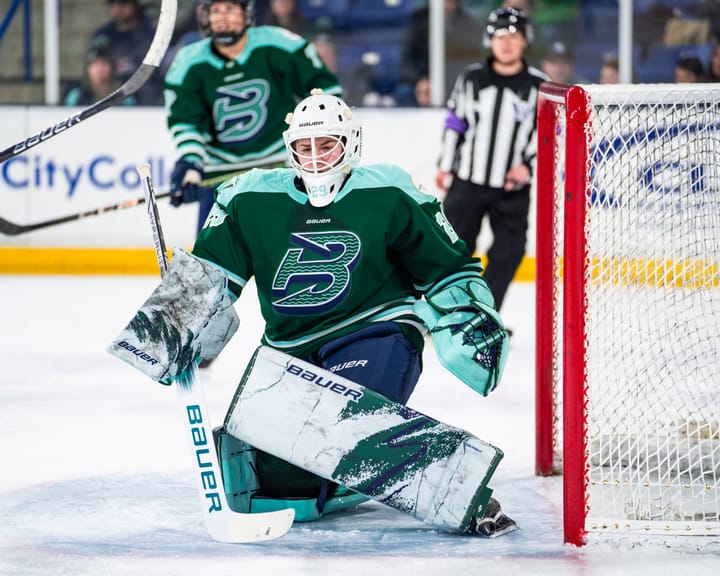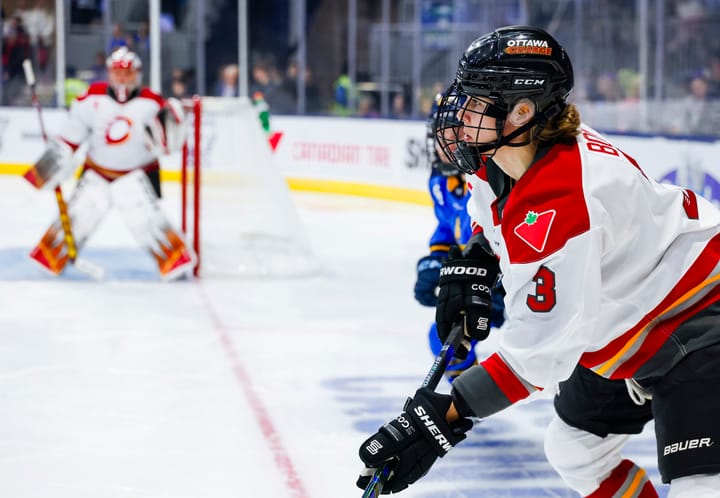Bulbul Kartanbay: Chasing a Dream
A story about perseverance, the love of the game, and the pursuit of a dream
According to the IIHF, there are just 171 registered female hockey players in Kazakhstan, a landlocked central Asian nation with an estimated population of 18.6 million people. Bulbul Kartanbay is one of those 171 players. This is the story of the long, winding road she has taken to fulfill a dream that began on the other side of the planet.
Kartanbay’s story isn’t just unique because she comes from a country with a small fingerprint in the world of women’s hockey. It’s unique because she has faced a harrowing number of obstacles — even by the standards of women’s athletics — and she’s still skating and smiling.
In Kazakhstan, sports like wrestling, boxing, and soccer are king. Conversely, women’s hockey is barely a blip on the radar. Because hockey is so uncommon for girls and women in her home country, Kartanbay began playing the game she’s now infatuated with at the age of 13. By that time, most girls hockey players in North America have already been on the ice for half a dozen years.
“I want [to] play in USA.”
Now 26, Kartanbay doesn’t feel that the women’s game has grown much in Kazakhstan. The national women’s team, currently ranked at an all-time low of 19th in the world by the IIHF, hasn’t played in the top division of the Women’s World Championship since 2009.
“No, I don’t think it’s growing much,” Kartanbay admitted in an interview with The Ice Garden. “I started when I was 13, which isn’t good for hockey. In Kazakhstan, women [are expected to] go to college and get married. Sometimes, girls have no choice and chances to pursue their own dreams and goals in life, which is terrible.”
Despite the late start to her hockey career, Kartanbay made the national team as a teenager in 2012. However, she was cut after failing to pick up a point in five games at the 2012 Division 1A Women’s World Championship. Because there was nowhere else for her to play, she took up rugby for two years. Then, an opportunity presented itself. The Barys KHL team created the Tomiris Astana club in 2013 and Bulbul got back on the ice. Three years later, she regained her spot on the national team.
Kartanbay was a key player for Tomiris and was a captain for multiple years. It was during her time with the club that she and her teammates first heard about the NWHL. To this day, she remembers discussing what the creation of a league in the U.S. where players were paid to play could mean. She also remembers how impactful it was for her to meet Sami Jo Small, then a goaltender with the CWHL’s Toronto Furies the following spring.
Small visited Kazakhstan as part of a Canadian delegation featuring hockey starts celebrating 25 years of diplomatic relations between Canada and the former Soviet republic. A founding member of the CWHL, she made a point of meeting the local club team. Kartanbay was inspired. She wanted to play in North America. She wanted to play pro women’s hockey with the best players in the world.
Just one month after meeting Small, Kartanbay wrote her first-ever tweet. She made her intentions clear with five simple words: “I want [to] play in USA.”
Work hard, play hard. #kartanbay
— Bulbul Kartanbay (@kartanbay) June 29, 2017
I want play in USA 🔥💃🏻 pic.twitter.com/9fTx4U9mNF
Just over two months after creating some buzz in the women’s hockey world for the stickhandling skills she displayed on social media, Kartanbay was selected in the third round of the 2017 CWHL Draft, 15th overall, by the Boston Blades. It looked like another life-changing opportunity had presented itself after years of hard work, but then she hit a wall made of red tape.
Kartanbay could not acquire the work visa that she needed to play with the Blades for the 2017-18 season. Defeated, she shared her frustration on social media and stated that she was unwilling to immigrate to the United States. All she wanted to do was play pro hockey.
“Oh, it was terrible,” Kartanbay explained. “We even called the Foreign Ministry to help us, but still failed. I gave up, and stopped training at 100 percent. It was a big disappointment. If it wasn’t for my mom believing in me and helping me, I would probably not be playing right now.”
Although she admits that she was not on top of her game, Kartanbay scored 10 goals and picked up six assists in 11 games as the captain of Tomiris Astana during the 2017-18 season. She finished second on her team in scoring that year. However, she failed to pick up a point in five games at the 2018 Division 1B Women’s World Championship. After that showing, she was hungrier than ever before to improve her game.
It was at this point when Calgary Inferno general manager Kristen Hagg reached out to Bulbul. Hagg had noticed Kartanbay’s social media posts and recognized an opportunity to help a player from a country where women’s hockey was in its infancy. She decided to do something that very few of us would do: she opened her home to someone with a dream.
She also offered her a spot in the Inferno’s training camp, which meant an opportunity to train with what was likely the most talented professional women’s hockey team in the world. Another door had opened.
“I wanted to help her experience hockey at a different level then she’d ever seen before, and give her a shot at making it to the CWHL,” Hagg told The Ice Garden. “Bulbul moved in with me in June 2018 and skated and trained with the team over July and August. I saw firsthand how determined she was.
“When she was released from the Inferno training camp, she was understandably devastated and down on herself,” Hagg continued. “I told her she was skating with the best players in the world and shouldn’t take the release as a failure.”
With the support of Hagg, Kartanbay decided to continue playing in North America. She joined several former Inferno players on the Calgary Coyotes of the Southern Alberta Women’s Hockey Association (SAWHA) for the 2018-19 season. Kartanbay scored eight goals and notched 21 assists in 19 games with the Coyotes, finishing fourth on the team in scoring and earning just 6 PIM.
The fact that the CWHL has folded hasn’t derailed Kartanbay’s goal. Over the summer, she has been working with trainers on her speed and skill, including ReadReact Hockey in Minnesota. She has also attended two NWHL free agency camps; one in Minnesota and one in Buffalo. She told the Ice Garden that she can’t say which team looked stronger, because they were both very good.
“Her coming here and being on the ice with Olympic champions was quite an accomplishment and an inspiration for young women in countries where hockey is just getting started,” Hagg reflected. “I was excited for her when she said she was going on to Minnesota to train further and it was great to see she her once again take a shot at elite women’s hockey in the NWHL.”
Considering the fact that Kartanbay has been playing hockey for just over a dozen years, it’s remarkable to consider what she’s already accomplished playing the game that she loves. Hockey has taken her all over the planet. More importantly, it has brought strong and inspiring friends and mentors into her life.
“It was a big disappointment. If it wasn’t for my mom believing in me and helping me, I would probably not be playing right now.”
If she does get offered a spot on an NWHL roster, Bulbul is hopeful that she won’t run into the same visa issues that stopped her from playing in Boston two years ago. Clearly, it’s something on her mind.
“I hope this year everything will be okay,” Kartanbay shared. “It will be much easier if the [NWHL] helps players with the visa. If they will help and can find ways that players can easily stay in the country or receive the necessary documents that would be real support.”
Last season, star Finnish goaltender Meeri Räisänen told Meredith Foster of The Ice Garden that the NWHL helped her make it work, although the lengths to which the league went remain unclear. With that being said, there was an influx of international players last season. For the first time ever, members of the Swedish, Finnish, Czech, and German national team programs were in the NWHL.
Tryout camp for WhitecapsMn and BuffaloBeauts 💪🏼🏒👯♀️
— Bulbul Kartanbay (@kartanbay) August 1, 2019
My first time here 💪🏼#kartanbay pic.twitter.com/EcBqb5aC7b
Now, there’s a chance that Kartanbay could be the league’s first Kazakh player. It’s hard to say what kind of impact that would have on that nation of 18.6 million on the other side of the planet, but it would undoubtedly mean the world to at least one family. If not the NWHL, there’s a chance that the professional women’s league in Russia, which recently added the KRS Vanke Rays, could be her next stop.
Bulbul shared that the Russian pro league (ZhHL) has been discussing the addition of Kazhakstan’s Tomiris and Aisulu teams for three years, but it has yet to happen. If and when it does, it just might be the next door for her to step through.
“It will be a good way to grow our teams and players in Kazakhstan,” Kartanbay said. “I would like to try to play in [the ZhHL], but for now I prefer the NWHL. I like the atmosphere here —so many friendly and helpful teammates. Always positive.”
Editor’s Note: Portions of this interview were edited for clarity at the player’s request. Also per the player’s request, her surname is written as Kartanbay, as opposed to Kartanbayeva, which is what she is listed as on EliteProspects.com and other sites.





Comments ()